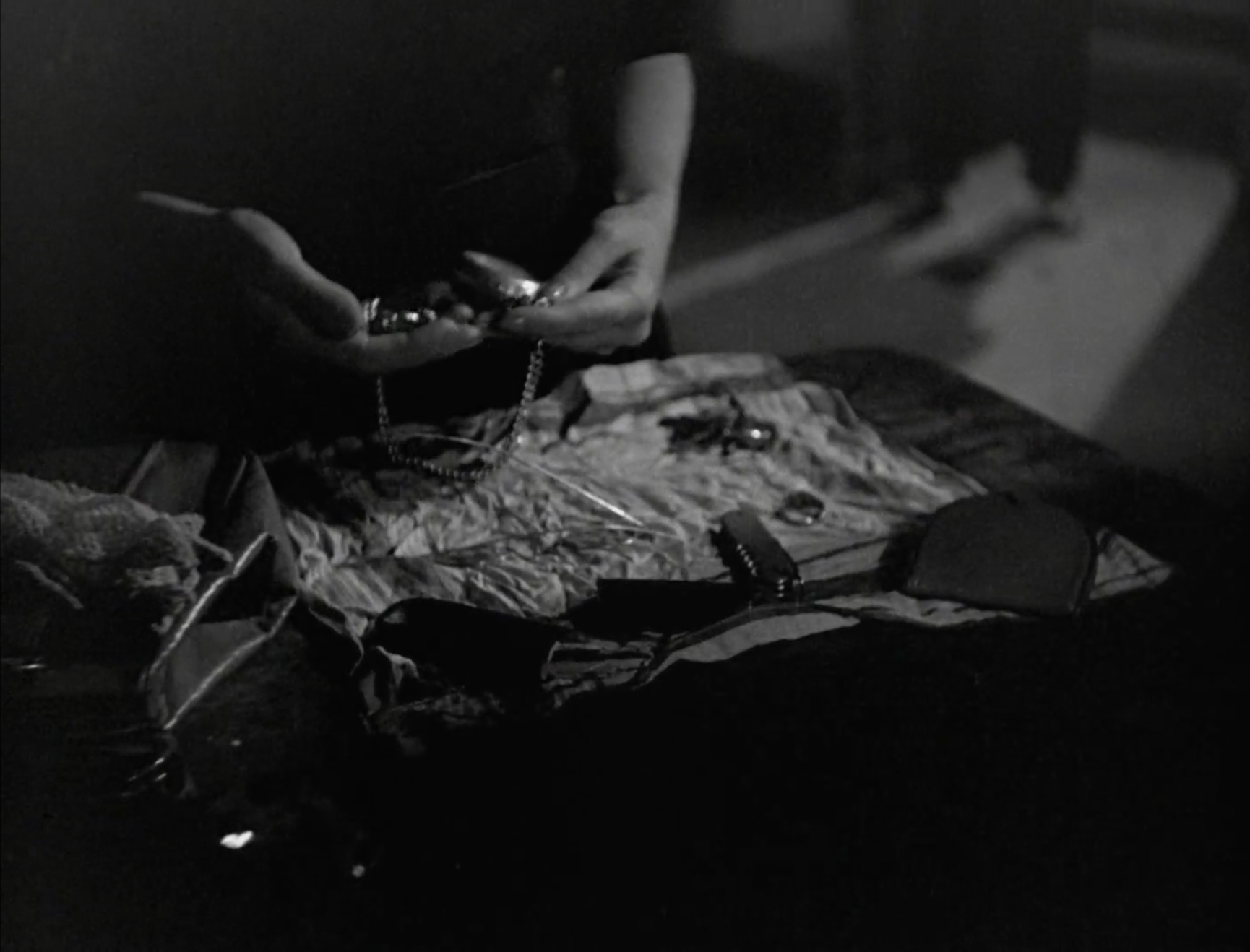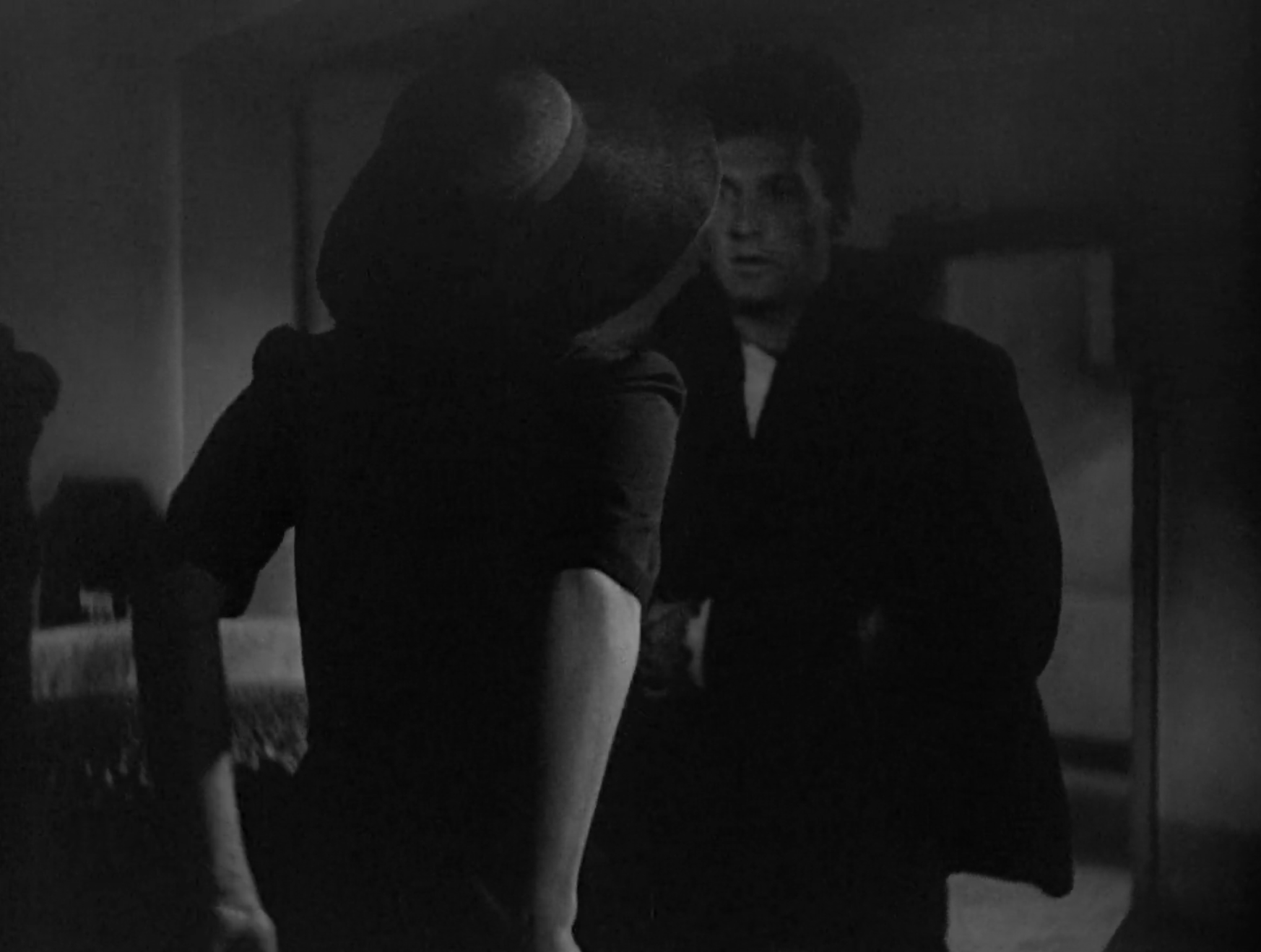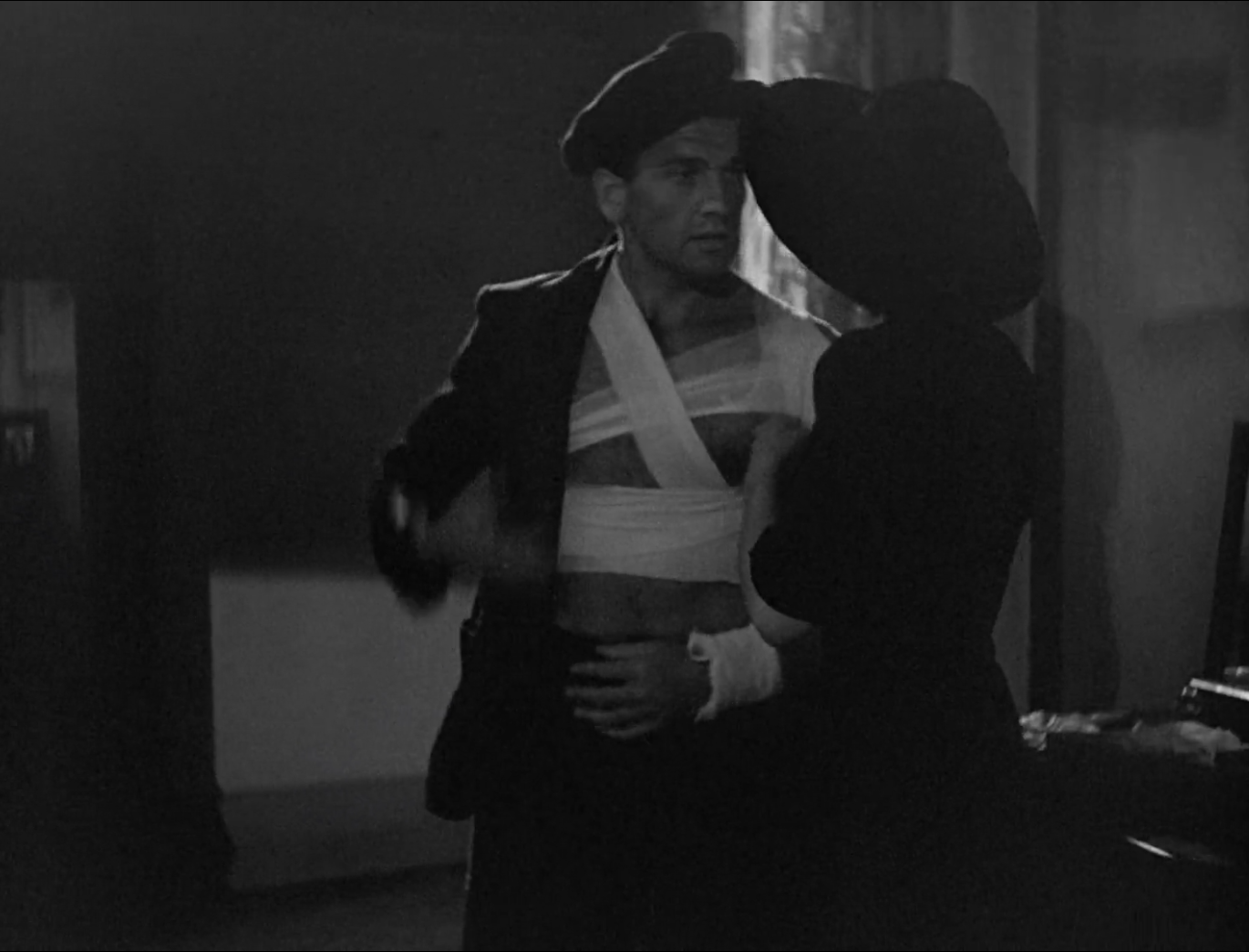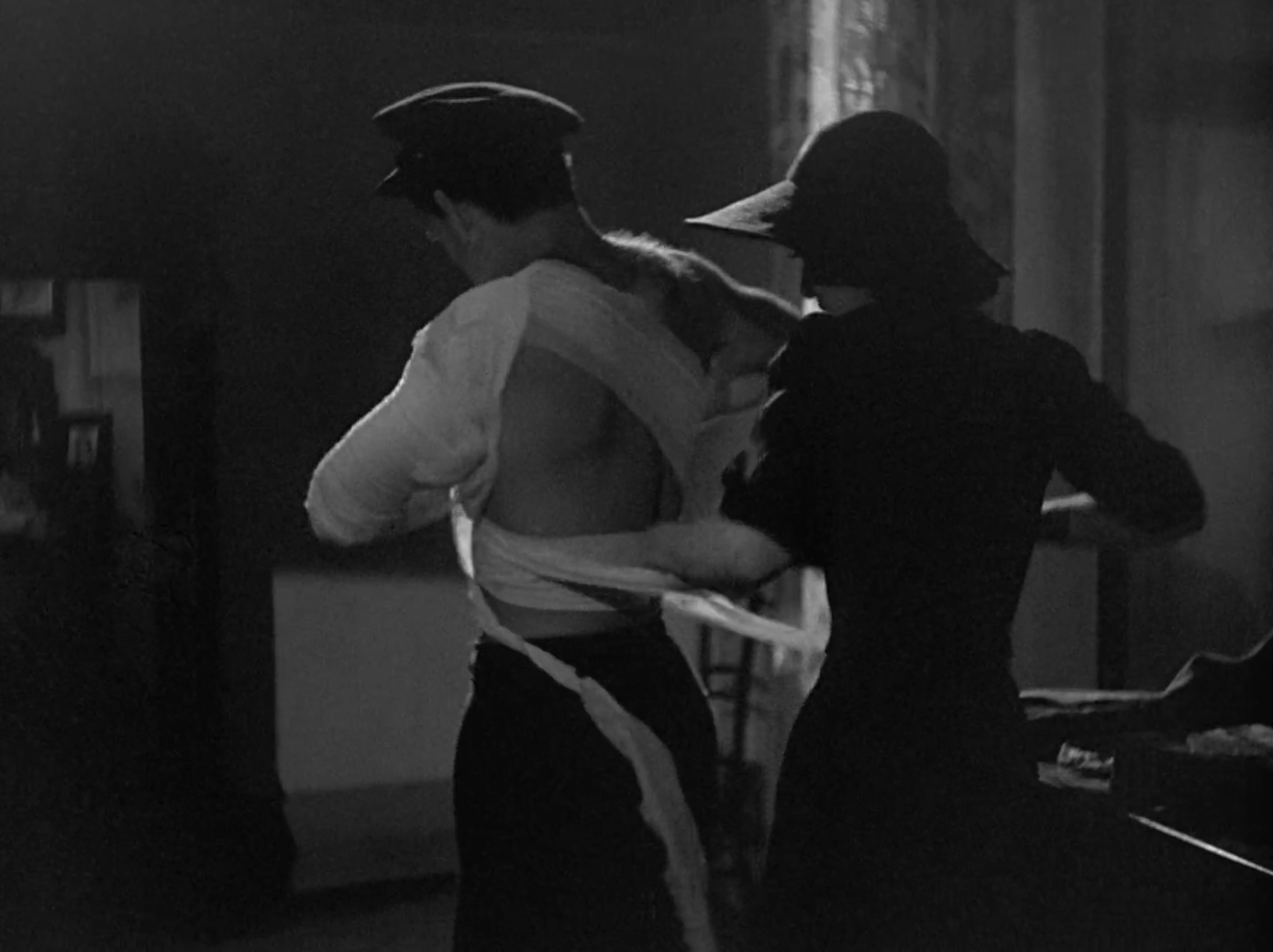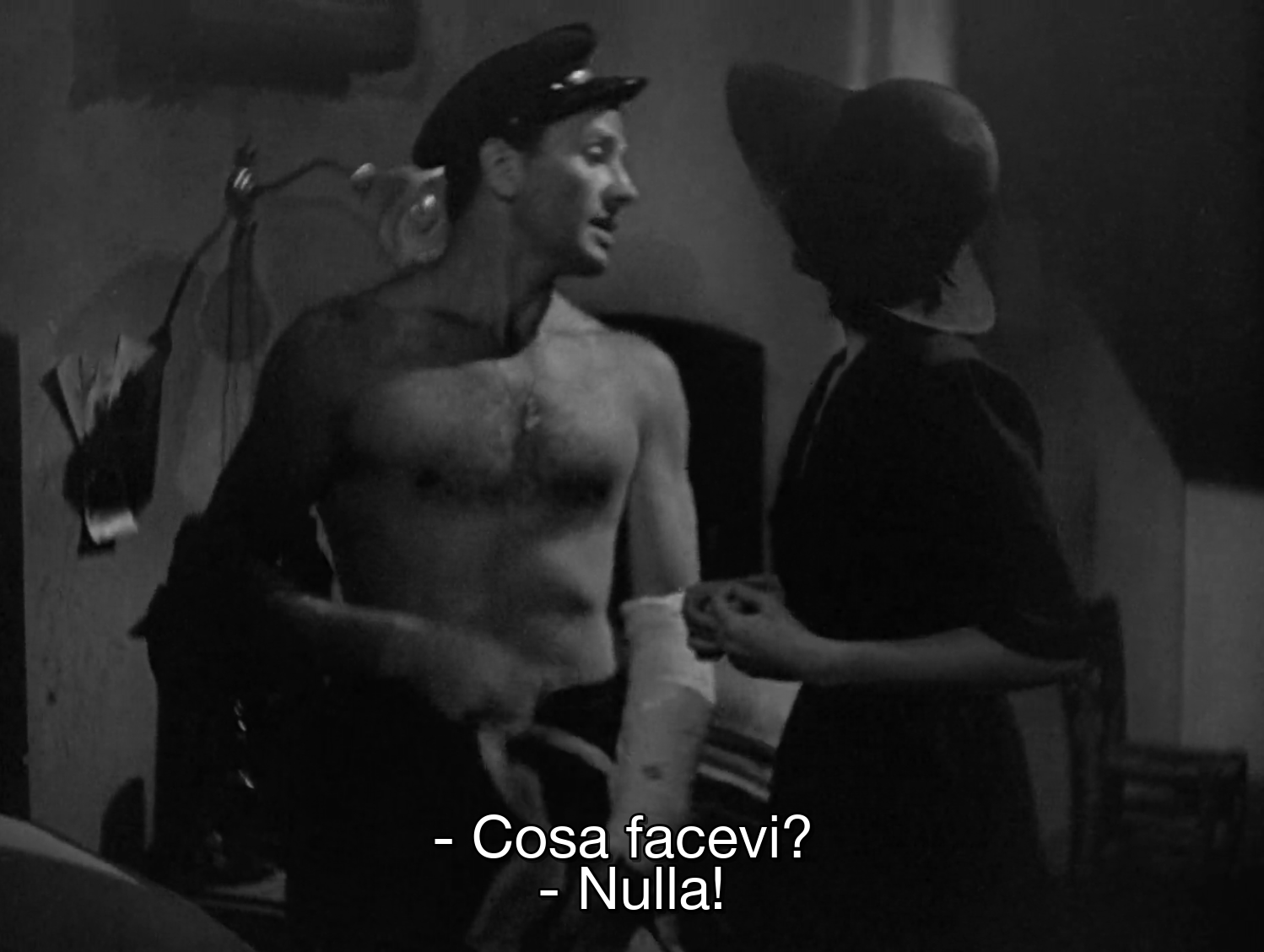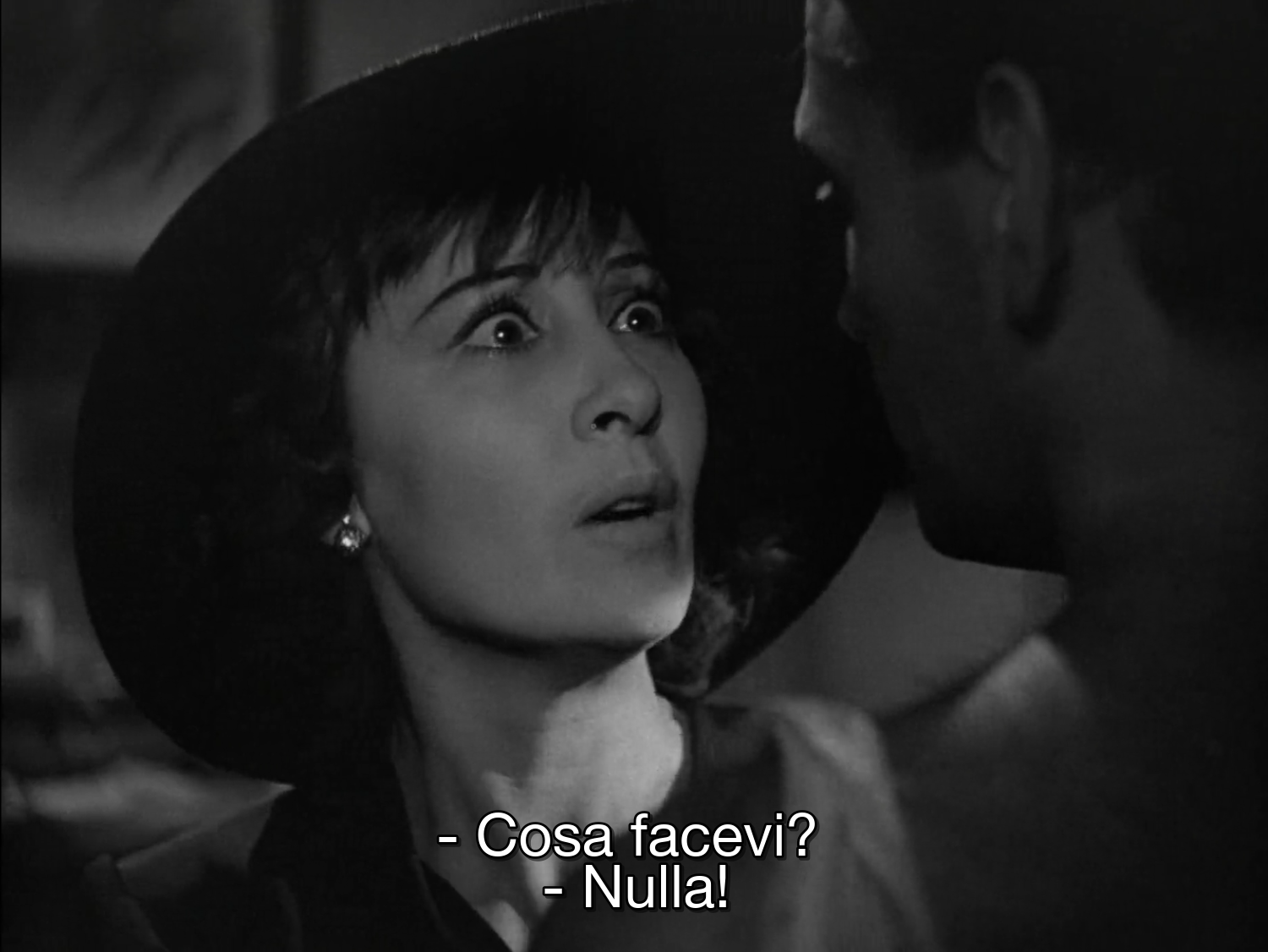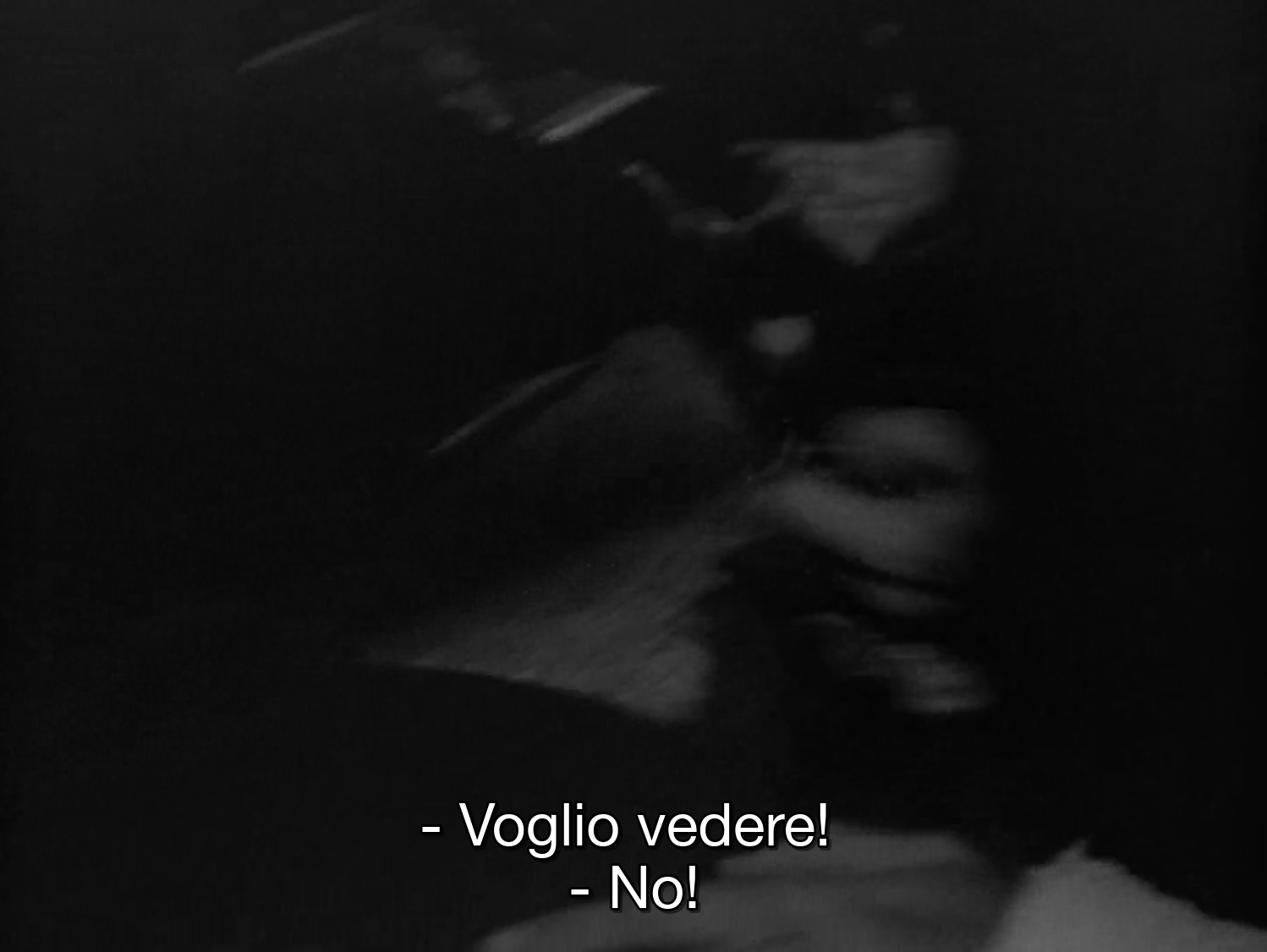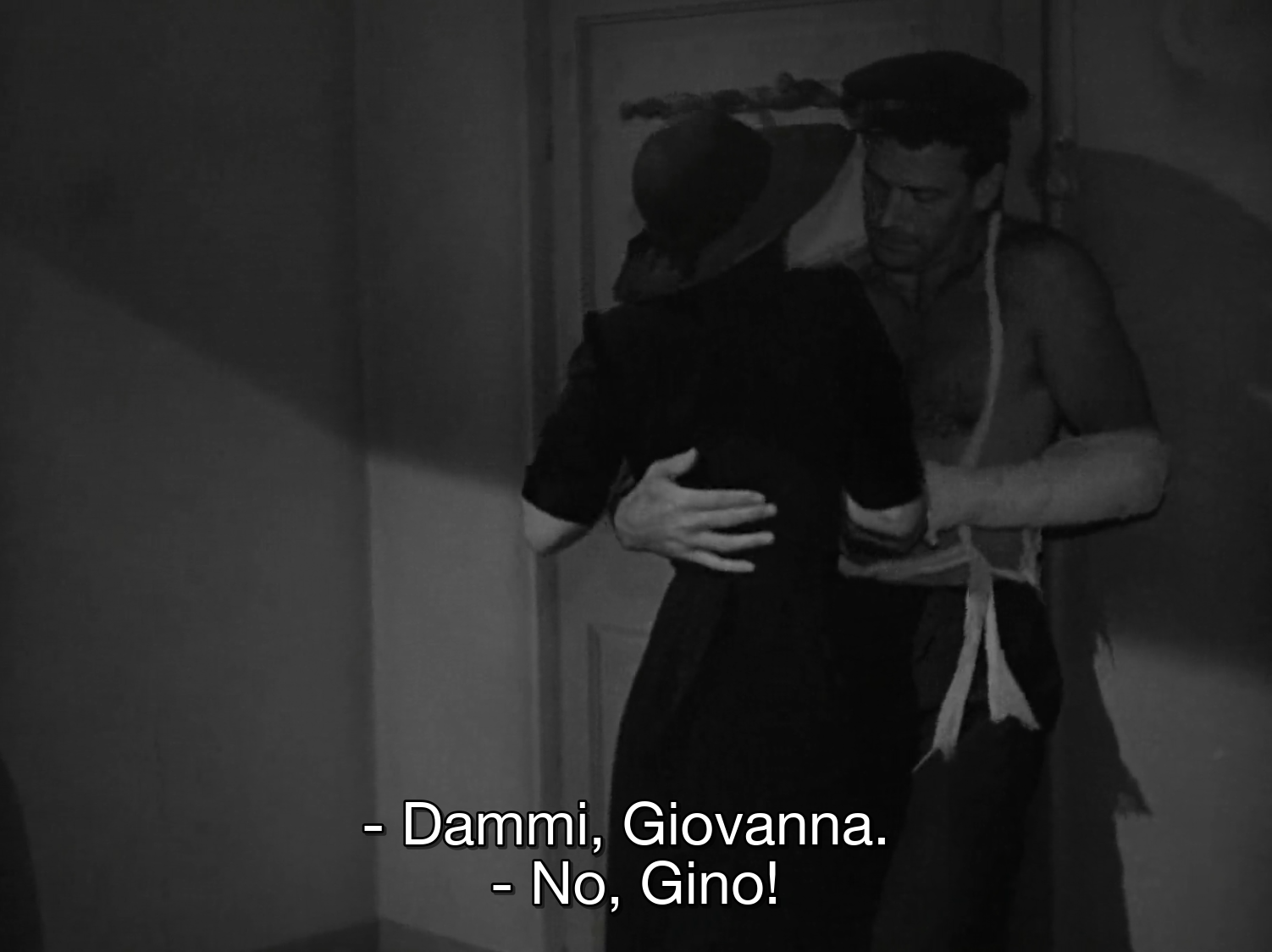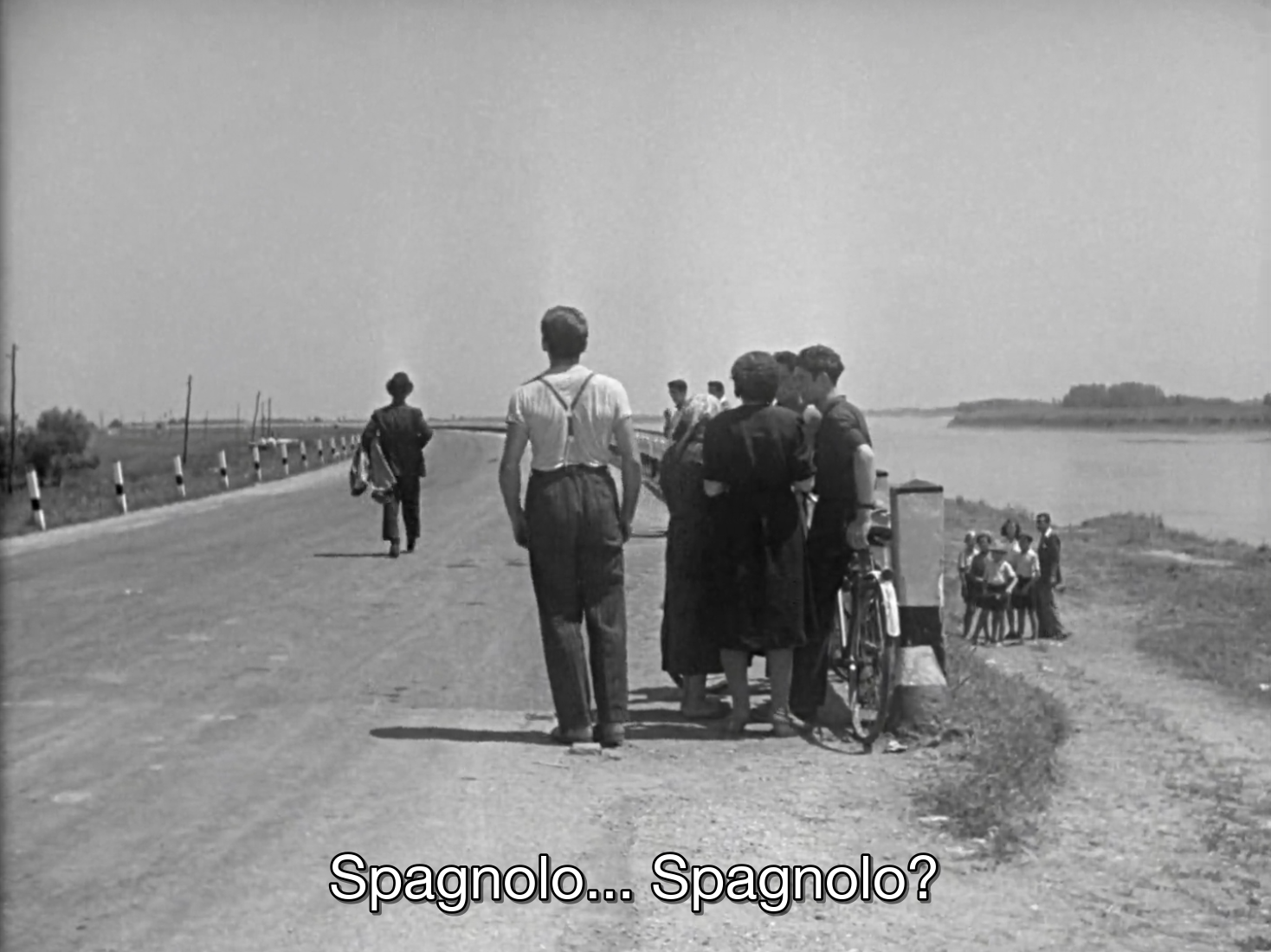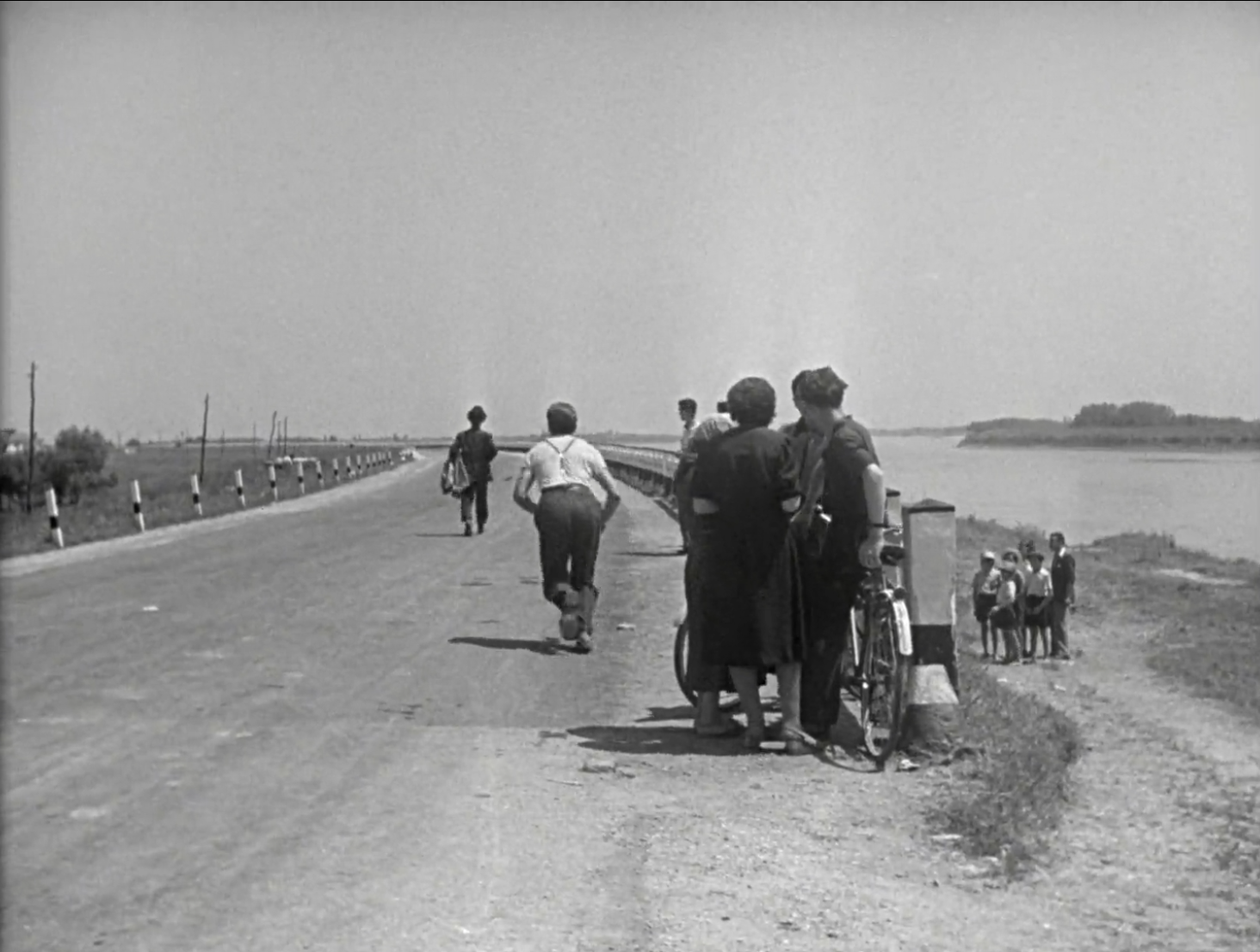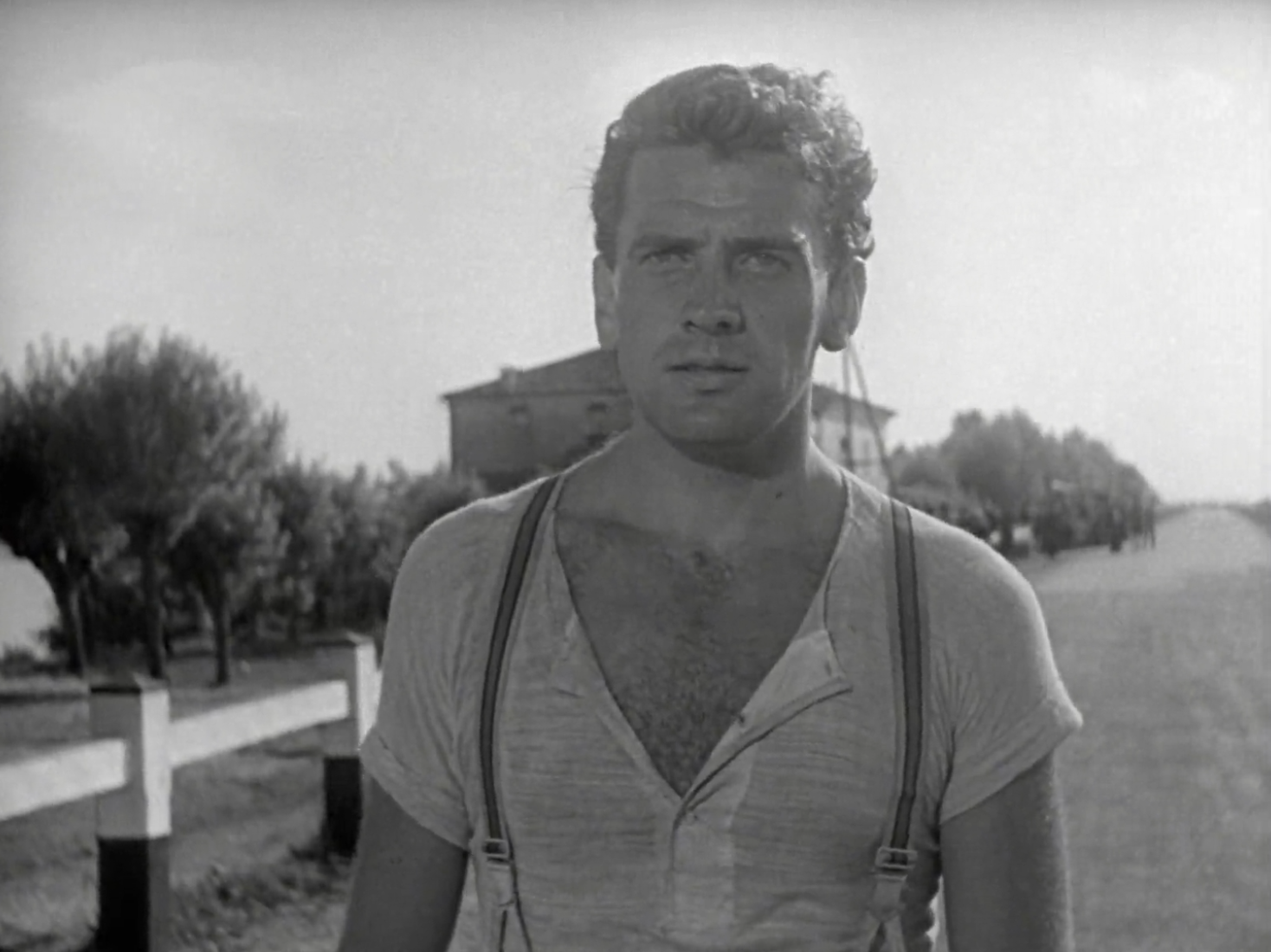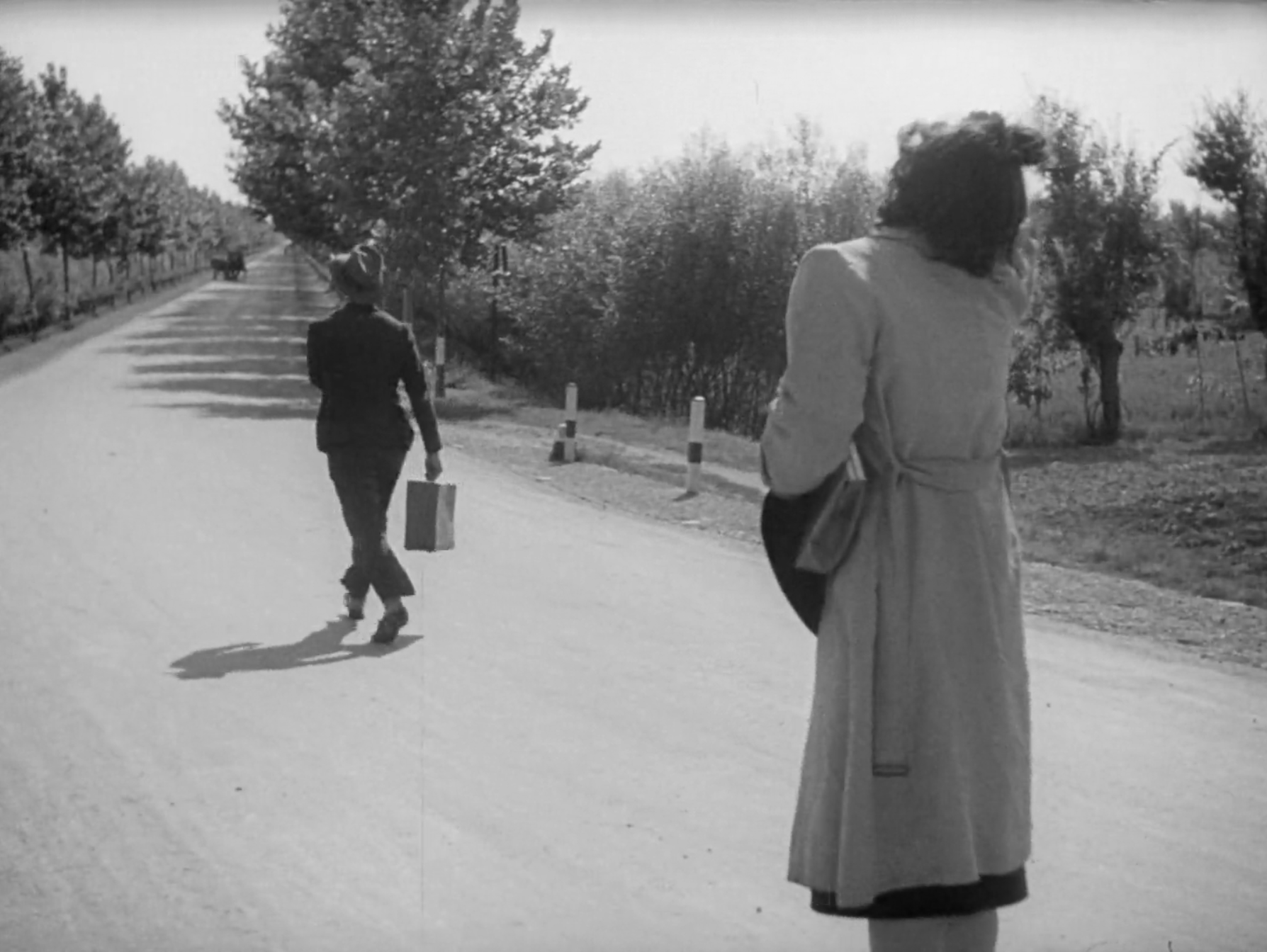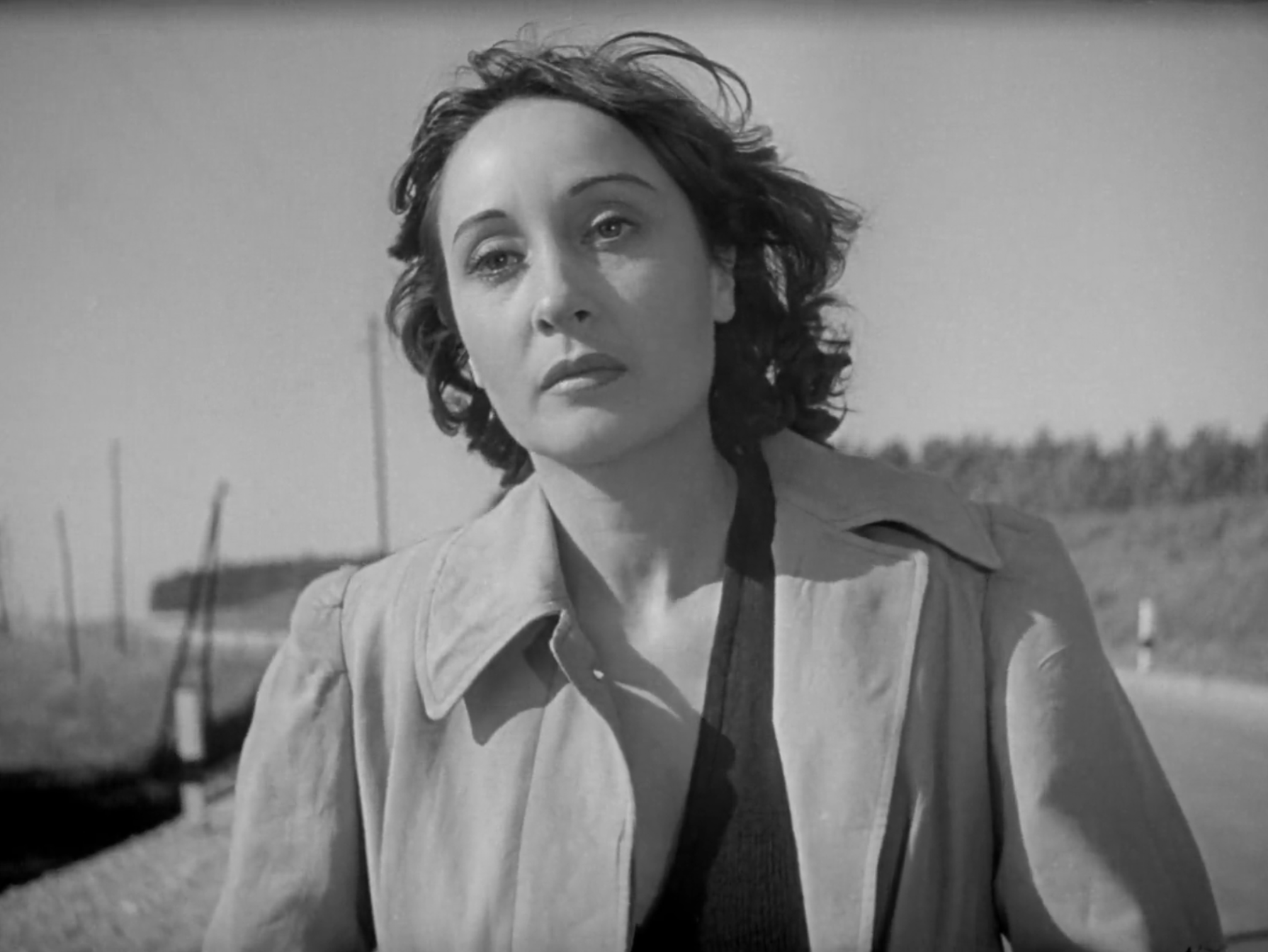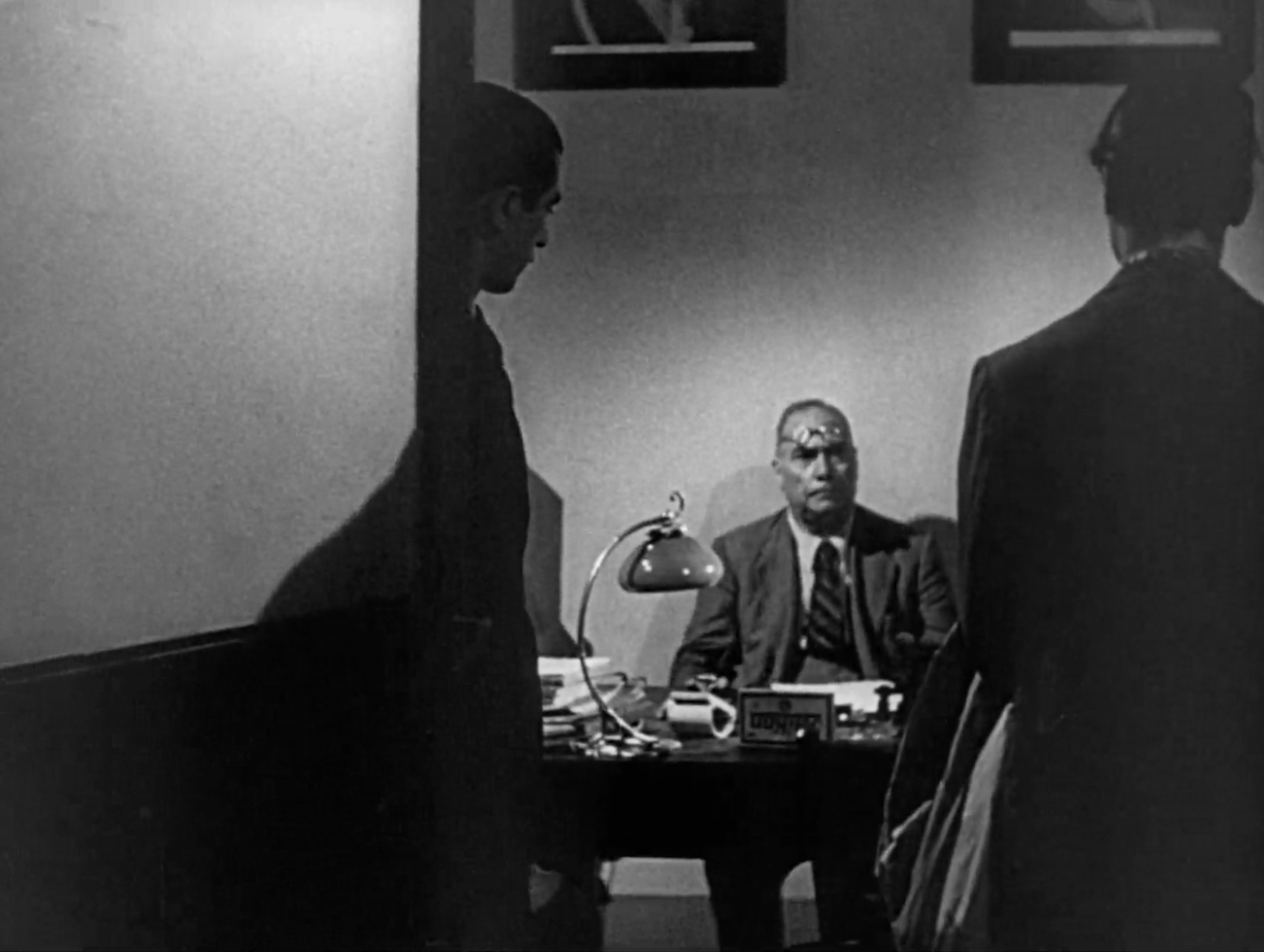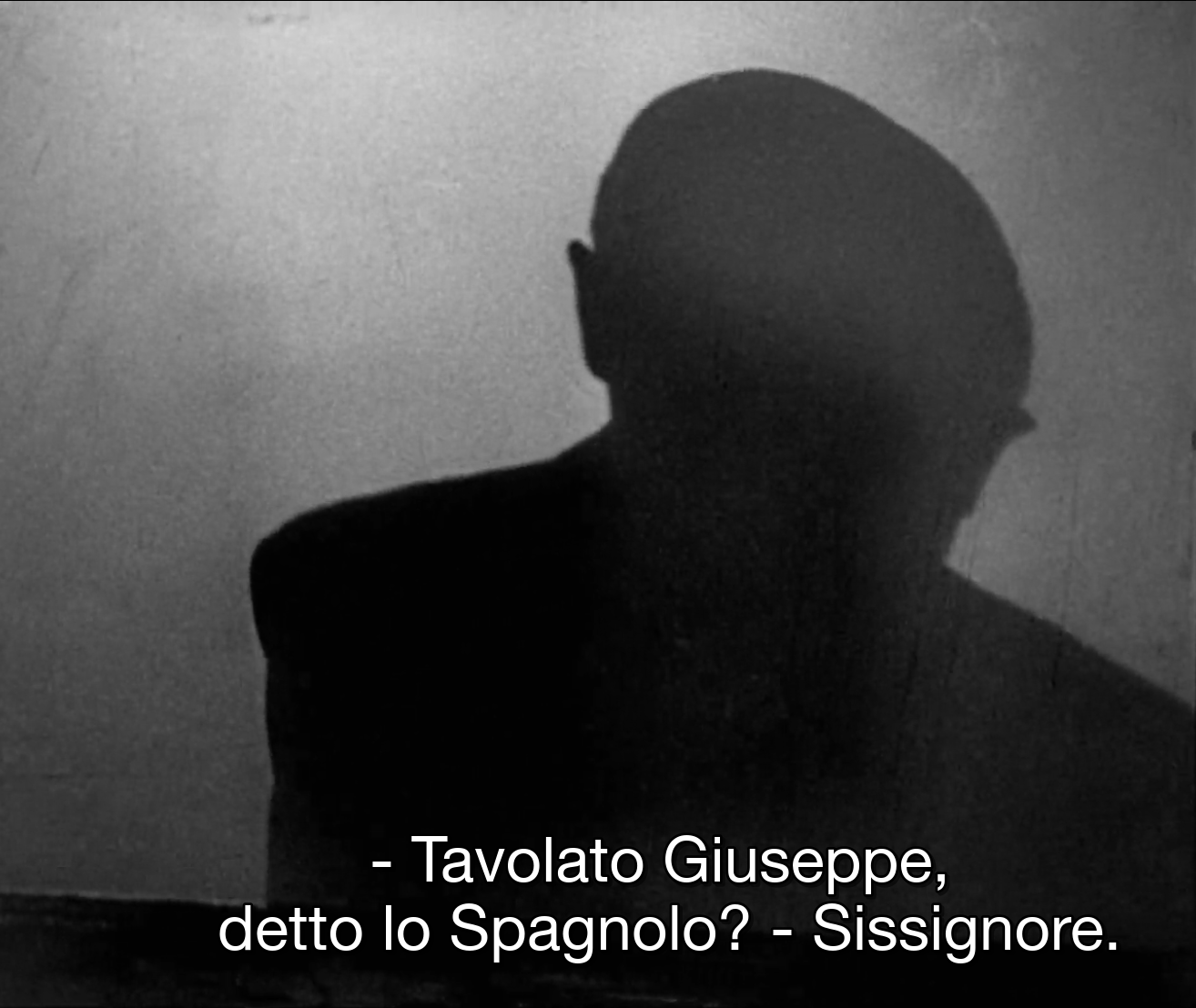Regia / Director: Luchino Visconti, 1943
Gino e Giovanna tornano alla trattoria di Bragana. Nell'ombra della casa, Giovanna inserisce la grande chiave nella porta d'ingresso.
Gino and Giovanna arrive back at Bragana’s tavern. In the shade of the house, Giovanna inserts the big key in the front door.
All'interno, le sedie sono impilate sui tavoli, le loro gambe rovesciate in un disegno geometrico. Gino strappa le pagine di un calendario e le getta a terra come per far sparire il tempo.
Inside, chairs are stacked on the tables, their upturned legs in a geometric pattern. Gino rips the pages off a calendar and tosses them onto the floor as if to make time disappear.
È sorpreso di sapere che Giovanna ha intenzione di riaprire il locale. Mentre lei argomenta le sue ragioni, cercando di sfiancarlo, lui siede lontano, su un tavolo, in silenzio, con gli occhi bassi, il piede che oscilla avanti e indietro. È consumato dall’insicurezza e dal senso di colpa per l'omicidio.
He is surprised to learn that Giovanna plans to reopen the place. As she argues her case, trying to wear him down, he sits far away, on a table, silent, eyes downcast, his foot swinging back and forth. He’s consumed with self-doubt and guilt about the murder.
Finalmente Gino parla: devono partire. Sennò, si rivedrà sempre Bragana davanti.
At last, Gino speaks: they must leave. If not, he will always see Bragana in front of him.
Giovanna va al piano di sopra. Sta guardando le cose di Bragana quando Gino la raggiunge.
Giovanna goes upstairs. She’s looking at Bragana’s belongings when Gino reaches her.
Lei lo aiuta a togliersi la giacca e poi le bende.
She helps him off with his jacket and then his bandages.
"Cosa facevi?" Lui guarda verso il cassettone dove lei si trovava un attimo prima.
"Nulla!" Si vergogna lei.
“What were you doing?” He looks over at the dresser where she was a moment ago.
“Nothing!” She’s ashamed.
Lei si precipita al cassettone e afferra l'orologio d'oro da tasca.
“Lasciami vedere!”
"Che ti importa?!"
"Voglio vedere!" insiste.
“No!”
Lottano mentre lei lo tiene dietro la schiena.
"Dammi, Giovanna!"
"No, Gino!"
She rushes over to the dresser and grabs the gold pocket watch.
“Let me see!”
“Why do you care?!”
“I want to see!” he insists.
“No!”
They struggle as she holds it behind her back.
“Give it to me, Giovanna!”
“No, Gino!”
Finiscono a letto baciandosi appassionatamente, con Giovanna che stringe ancora l'orologio nella mano. È un motivo del film: il simbolo del possesso e della stabilità che Giovanna brama.
They end up in bed kissing passionately, Giovanna still clutching the watch in her hand. It’s a motif in the film: the symbol of the possessions and stability that Giovanna craves.
Bocce. Mentre giocano, i vecchi del quartiere spettegolano sui loro vicini della trattoria.
"Non sembrano felici".
"Litigano sempre!"
Bocce balls. As they play, the old men from the neighborhood gossip about their neighbors at the tavern.
“They don’t seem happy.”
“All they do is argue!”
All'interno della trattoria, Gino e Giovanna stanno effettivamente litigando, e davanti alla bambina che lavora per loro. Lui vuole un nuovo inizio. Vuole vendere tutto e andare via, ovunque. Ma lei è determinata a rimanere. Insiste: "Hai imparato tanti mestieri; puoi imparare anche questo!”
Inside the tavern, Gino and Giovanna are indeed quarreling, and in front of the little girl who works for them. He wants a fresh start. He wants to sell everything and go away – anywhere. But she is determined to stay. She insists,”You’ve learned so many trades; you can learn this one too!”
Ma questa non è una vita per lui. "Non è un mestiere fare la guardia alla casa di un morto". Sono seduti fianco a fianco, nessuno dei due guarda l'altro. Lo sguardo, un tempo così potente, si è spento.
But this is not a life for him. “Being the keeper of a dead man's house is no trade.” They sit side by side, neither looking at the other. The gaze, once so powerful, has been shut down.
Giovanna ha ingaggiato un’orchestra. La gente della zona è ammassata sulla pista da ballo. Gli uomini ballano con gli uomini, le donne ballano con le donne.
Giovanna has hired a band. Locals are crowded onto the dance floor. Men dance with men; women dance with women.
Gino è al piano di sopra. Guarda le cose di Bragana, prende l'orologio da tasca, poi lo lascia cadere come se fosse veleno. Va alla finestra e guarda giù. In piccoli gruppi, la gente è sparpagliata sull'erba fuori dalla trattoria, a bere e a parlare. Le biciclette sono ovunque.
Gino is upstairs. He looks at Bragana’s things, picks up the pocket watch, then drops it as if it’s poison. He goes to the window, and looks down. In small groups, people are sprawled on the grass outside the tavern, drinking and talking. Bicycles are everywhere.
Improvvisamente il suo viso si illumina. Può essere? È lo Spagnolo, che si aggira tra la folla! Gino si gira per scendere a salutare il suo amico.
Suddenly his face lights up. Can it be? It’s lo Spagnolo, wandering through the crowd! Gino turns to go down and greet his friend.
Si fa strada sgomitando tra la folla. In un film pieno di echi, questa è un’eco di quel giorno alla fiera di Ancona quando si è precipitato a raggiungere Bragana e Giovanna al concorso di canto.
He pushes his way through the crowd. In a film full of echoes, this is an echo of that day at the fair at Ancona when he rushed to join Bragana and Giovanna at the singing contest.
Gino corre felice dallo Spagnolo, che gli dice che non è stato difficile trovarlo. Tutti nella zona parlano di lui.
Gino runs happily up to lo Spagnolo, who tells him he hadn’t been hard to find. Everyone in the area is talking about him.
Si siedono sulla riva del fiume – proprio come si erano seduti sul muro ad Ancona dietro il Duomo. Lo Spagnolo invita Gino a unirsi a lui, per visitare tutti i bei posti: Sicilia, Napoli, Genova. Ma Gino – che indossa una camicia più bella di prima – non vuole più vagabondare. È cambiato.
They sit on the riverbank – much as they sat on the wall in Ancona behind the Duomo. Lo Spagnolo invites Gino to join him, to visit all the beautiful places: Sicily, Naples, Genoa. But Gino – wearing a nicer shirt than before – doesn’t want to tramp anymore. He has changed.
I due uomini stanno quasi a contatto, accanto a un albero. Due biciclette identiche e la lunga linea orizzontale di una costa lontana li avvicina nell'inquadratura. In una sola immagine, Visconti sottolinea l'intimità del loro legame.
The two men stand almost touching, beside a tree. Two identical bicycles and the long horizontal line of a distant coast pushes them closer together in the shot. In a single image, Visconti emphasizes the intimacy of their connection.
Lo Spagnolo è disgustato dal nuovo Gino. "Credevo di poterti ancora parlare come a uno dei nostri". Aggiunge: "Certe cose si pagano", facendo una chiara insinuazione sulla morte di Bragana.
Gino colpisce lo Spagnolo e lo fa cadere a terra. La scena attira l'attenzione dei presenti.
Lo Spagnolo is disgusted with the new Gino. “I thought I could still talk to you like one of us.” He adds, “Such things have to be paid for,” making a clear insinuation about the death of Bragana.
Gino socks lo Spagnolo and makes him fall to the ground. The scene draws the attention of the bystanders.
In un campo lungo, vediamo lo Spagnolo dirigersi di nuovo verso l'autostrada, lontano dalla trattoria. Pieno di rimorso, Gino lo chiama e gli corre dietro con poca convinzione.
In a long shot, we see lo Spagnolo head back down the highway, away from the tavern. Filled with remorse, Gino calls out and runs half-heartedly after him.
Vediamo lo Spagnolo svanire nel paesaggio, mentre Gino lo segue con lo sguardo, proprio come Giovanna ha guardato Gino lasciarla prima nella storia.
We watch lo Spagnolo fade into the landscape, as Gino gazes after him, much as Giovanna watched Gino leave her earlier in the story.
Un uomo si presenta all'ufficio del commissario. Lo vediamo in silhouette, da dietro.
Un funzionario dice: "Tavolato Giuseppe, detto lo Spagnolo?"
"Sissignore”.
Lo schermo diventa nero.
A man presents himself at the Commissioner’s office. We see him in silhouette, from the back.
An officer says, “Tavolato Giuseppe, known as lo Spagnolo?”
“Yes, sir.”
The screen goes black.
I musicisti stanno lasciando la trattoria, portando i loro strumenti sotto il braccio; alcuni vanno in bicicletta. Dei detriti sono sparsi per terra e Gino siede curvo su una sedia, fumando. Si alza e passeggia fuori dall'inquadratura proprio mentre Giovanna ci entra dal bar.
The musicians are leaving the tavern, carrying their instruments under their arms; some ride bikes. Debris litters the ground and Gino sits slumped in a chair, smoking. He gets up and ambles out of the frame just as Giovanna enters it from the bar.
Lei lo trova al fiume, abbattuto, gli occhi pieni di lacrime. Un anno prima, dice lui con brama nella voce, era sulle montagne di Apuania, a lavorare nelle miniere.
She finds him by the river, downcast, eyes brimming with tears. A year before, he says with yearning in his voice, he was in the mountains of Apuania, working in the mines.
Giovanna dice: "Parli come se io non ci fossi". Lui si allontana verso la trattoria, nella penombra, mentre lei lo segue.
Giovanna says, “You talk as if I weren’t here.” He walks away toward the tavern, in the twilight, as she trails behind.
Tornano a casa e Gino va a letto. Giovanna entra nella cucina piena di piatti sporchi. Si siede e si serve della zuppa. Sembra che sia tornata al punto di partenza, legata a una cucina, e sola come sempre.
They get back home and Gino goes up to bed. Giovanna enters the kitchen filled with dirty dishes. She sits and serves herself some soup. She seems right back where she started, tied to a kitchen, and alone as ever.
Esausta, mette da parte la zuppa, appoggia la testa sulle braccia e si addormenta.
Exhausted, she puts the soup aside, lays her head on her arms, and falls asleep.
FINE PARTE VI
Here is the link to Parte VII of this cineracconto. Subscribe to receive a weekly email newsletter with links to all our new posts.








